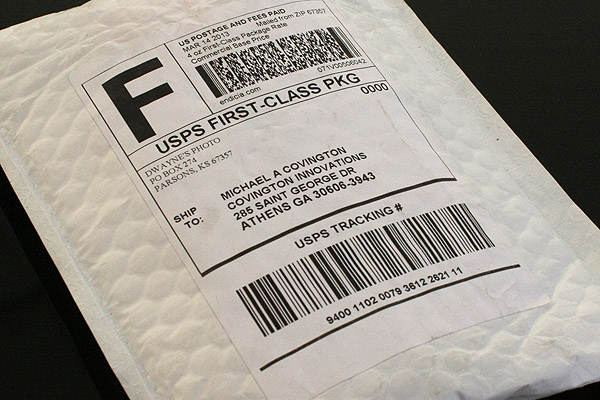 |
|
 |
| |
|
2013
March
31
|
Feast day of the Resurrection of Our Lord

Permanent link to this entry


|
2013
March
25-30
|
Hasty notes at a busy time
It's a frenzied time of year. As I transition from being a professor to being
a consultant, I've had a lot of meetings with clients and associates, people are
full of energy and enthusiasm, and of course meanwhile
my regular academic workload hasn't diminished.
My students are disappointed that computer understanding of human language isn't
a solved problem — it's a rapidly-progressing technology, but not to the point
where we can give you finished, ready-to-use solutions.
Our dogs are disappointed that I won't let them eat electronics; Holly has devoured
a CF reader and a jump drive, and the house is now littered with "bait," small discarded
electronic devices that have been sprayed with bitter grapefruit extract.
If all of the following sections seem to have been written in haste, that's why!
Permanent link to this entry
Recommended: Asus Zenbook UX32A
I have a new 3.2-pound laptop, an Asus Zenbook UX32A.
(Sorry, I'm too busy to insert hyperlinks, but you can easily find it.)
I'm still having enough trouble with my ribs that I wasn't wanting to carry
the 6-pound Lenovo around. The new one is like a Macbook, but for Windows
and is a delight to use. Highly recommended.
Permanent link to this entry
Mildly puzzling: Windows 8
The Zenbook is my entry into the Windows 8 world. A while back, at UGA, I beta-tested
Windows 8 for Microsoft, but at the time, you could turn off the Metro user interface,
and I did. I then concluded Windows 8 was just like Windows 7, found nothing wrong with it,
and proceeded to ignore it.
I was a bit surprised to find that in the real Windows 8, you can't turn off Metro.
That option was only given us during the beta because they were afraid something might
be wrong with Metro that would interfere with our other tests.
Anyhow, the key idea of Windows 8 is to have one operating system both for desktop computing and for
small tablets, smartphones, and the like.
The desktop user interface works the same way as always, but the desktop is only one of the things
you can have on your screen. Instead of the desktop (with all the programs that might be running
in it), you might want to look at the Start Screen (covered with panels) or one or, at most,
two Metro apps (smartphone-style software that fills the entire screen).
Now, one of my first impressions was: They've taken the best thing about Windows and gotten
rid of it. Metro isn't windowed! You can only see one app at a time (or, in one special
mode, two at a time), and you use Alt-Tab to switch between them.
It's not quite that bad, because another way to think of it is that the Start Screen is the old
start menu "writ large." Now it's the full screen (together with the "All Apps" button) and the
key to living with Windows 8 is to start customizing it right away, so your frequenly used apps
are grouped logically over toward the left. The key insight behind this, I'm told, is that Microsoft
found that when people brought up the start menu, they didn't look at anything else — so,
arguably, the start menu needed to become the whole screen, and did.
The other key to success with Windows 8 is to use Alt-Tab a lot, to switch among the various screens and programs
that might be running, not all of which are on the desktop.
I'm not fond of running Metro aps on a desktop-sized screen. They're fine for smartphones and tiny tablets.
And I hope the start button comes back when Windows 8 undergoes a major update this summer.
I'm aware of Classic Shell, a freeware utility that brings it back (not hard; it still exists as
a file folder structure), and I may install Classic Shell.
Permanent link to this entry
While America debates gay marriage...
I'm not going to take a position (here) on the gay marriage debate.
If I do, no matter whether I'm for it or against it, lots of people will
(1) stop listening to anything I say, and (2) want to cut my throat.
[Note: That does not mean I have no convictions on this issue!
All it means is that rather than take sides immediately, I'm going
to ask people to think.]
Instead of taking sides, I'm going to make two remarks about
defining the question. I really think one reason
the issue is so contentious is that people haven't thought through the
underlying questions.
Point 1: The biggest underlying question is whether marriage is something real
that would exist whether or not we had a name for it, or whether it's just
something society made up. Is it like parenthood, which is a real
biological relationship that would exist even if human society ignored it,
or is it like being a member of the country club, which is obviously entirely
up to the club and its members to define?
People seem to be taking a number of positions on this: (1) marriage is real
and means what almost all human beings have always thought; (2) marriage is real but a new
kind of it has just been invented; or (3) marriage is just a label that
society pins on some pairs of people and not others.
(I note in passing that
no-fault divorce laws were a big step toward (3), toward treating marriage as
just an arbitrary social agreement. I also note in passing that gay marriage
was absolutely unheard-of 40 years ago.)
Point 2: There is a lot to be said for getting government out of the marriage business,
i.e., simply having no legal definition of marriage at all. Instead, marriages would be
recorded by churches, civic organizations, etc., and one can imagine a large private organization
that records marriages, preserves the information for posterity, and does not itself judge whether
any marriage is valid, but keeps track of the facts that would affect its validity in the eyes
of various community groups.
Would that work? "On the other hand not so fast," as Teddy Roosevelt would say.
A lot of government benefits pertain to marriage,
among them laws designed to protect children,
divorce laws (to protect the rights of married people when they split up, on the assumption
that they probably own property together and have made a commitment to provide for each other),
immigration laws, tax laws, Social Security, and so forth.
Some of those things might be reorganized to depend on parenthood (of children) or registered domestic
partnership (that is, let any two adults agree to take certain kinds of responsibility
for each other, if they have no conflicting prior obligations). Even so, we'd have to
be very careful that no one loses important government benefits.
What about simply letting states do the decision-making? Traditionally, there was no federal
definition of marriage; it was up to states to make the rules about age limits, consanguinity
(whether you can marry your cousin), and divorce laws. The federal government recognized whatever
marriages the states recognized.
The only wrinkle in that plan is that nowadays, at the federal level, a lot of policies and
benefits depend on marriage and were presumably crafted with a particular definition of marriage
in mind. Can a state redefine marriage in order to make the federal government provide Social Security
benefits to people it never planned to? That's the kind of problem that might come up.
Complicated, isn't it? It's much simpler to just pick one side and cheer for it, without doing
any practical thinking.
Permanent link to this entry


|
2013
March
22-24
|
To waiters and waitresses...
A few words to all the waiters and waitresses whom I rely on to bring me food...
I appreciate your hard work.
I tip generously (18-20%) because I know so many people don't. I think tipping is not
a fair way to pay people, but we're stuck with it, and I don't want you not to get what you're
earning.
In return, I have just a few requests.
Don't call me "we." If you say, "How are we doing today?" I'll reply,
"I can only speak for myself." If you ask, "Are we ready to order?"
I'll point to my wife and say, "I'm out on a date with her, not you."
Don't call me "hon" or "sweetie,"
especially if you've never seen me before. That's just creepy.
All the more so if you're 30 years younger than me.
Don't interrupt me in mid-sentence. I know you're under pressure to
work fast, but when I'm talking to someone else, you can wait another
two seconds for me to get to a stopping place.
Don't expect me to tip more than 20% for some obscure reason.
Here I'm referring to things I've seen in the media — no waiter has
ever said this to my face — but apparently someone is trying to put
out the word that we're expected to tip more than 20% under various
conditions.
Now, if I get a free meal with a coupon, I'll tip as if I were paying
regular price. If I get an unusual discount, I'll be sure to tip the full 20% of
what I paid, maybe more if the discount was substantial.
But don't expect me to calculate that the restaurant
should have charged me more for an ordinary meal, and then tip 20% of that hypothetical
amount. Sorry, that's just wishful thinking. If your employer underprices
the food, that's not my fault.
Don't balk at letting me put my tip on my credit card. If your employer
handles tips unfairly, that's a bad thing, but it's not my fault.
And if you want to be able to pocket your tips without paying income tax
on them, that's not fair to me or the other taxpayers. I'm not going to
give you cash under the table just to get around someone's recordkeeping.
And understand that I'm not likely to go on line and fill out a survey.
I spend too much time on line already; more web and e-mail chores are
not what I come to a restaurant to get.
There. Bon appétit!
A few afterthoughts...
Getting back to the issue of discounts, waiters and waitresses need to remember that
when the restaurant reduces its prices, it's in order to bring in more business and
raise income, including waiters' income. Yes, the tips are smaller, but there are more
of them.
And in what I wrote above, I had in mind full-service restaurants where the order
is taken at the table and the meal is paid for at the end.
It's not so clear what to do in places where the customers go
through a serving or ordering line and pay for their food before sitting down.
Do we leave tips for the people who wipe the tables at McDonald's?
Not as far as I know. Steak 'N' Shake gave us the useful term "workaurant"
for (partly) self-service diners (which theirs are not)...
Permanent link to this entry


|
2013
March
21
|
The Internet and my social life
I've figured out why the Internet suits me so well as a way of keeping in
touch with friends. It's the exact opposite of the telephone.
Let me explain, first, that for me, the Internet is not a substitute for social life.
I still see people face to face. But the Internet helps as an additional means of communication.
And it overcomes the main problem with the telephone.
I've never been fond of telephones, and here's why:
With a telephone, you can't invite attention, you can only demand it.
That, to me, feels vaguely impolite.
Other people should always get to choose whether or not to give me attention.
Text messages are less intrusive than phone calls, and I think that's why they're so
popular with younger people. (I've never really gotten into them.) Crucially, a text
message doesn't demand that the recipient drop everything and pay attention now.
It gives them more discretion, and that's a good thing.
(Contrast this with dating in the 1970s, something I was never especially good at.
The game was supposed to begin with the boy calling up a girl the barely knew and demanding
several minutes of her attention by telephone. I never knew whether a girl would welcome this,
and I generally assumed they wouldn't, so I didn't do much of it. Yet others were surprisingly
successful with almost random potshots. Today, other forums,
even texting, provide a less intrusive way to see if someone wants attention.)
What I like about Facebook (and, to a lesser extent, other online forums) is that it
is also a group forum; when I'm talking to one friend, other friends, and especially
Melody, are almost always at least potentially present. It's like a conversation in a
college common room or at a reception; other people can join in, and for that matter, people
can also leave easily. This helps me know that people really do want to talk to me.
I'm not holding them captive.
The public nature of Facebook combines nicely with my long-held belief that
"the real world is co-ed" and a person
can and should have friends of both genders. Plenty of the old friends that I keep up with
on Facebook are women. Because it's a public forum, with my wife and family members always
able to join in, I can do this without the appearance of impropriety.
It wouldn't be proper for a married man to carry on private
correspondences with 20 ladies, many of whom he knew before he met his wife. But with Melody
joining me on Facebook, my friends are her friends too.
This notebook entry was inspired by a Facebook conversation, and particularly by
this chart,
which was brought to my attention by Sue Gay and Dee Morton-Rossi
(a college friend and a high-school friend respectively). Look at "Internet" on the chart.
Permanent link to this entry


|
2013
March
20
|
Two more Ektachromes
Here are two more Ektachromes. These are presented with no digital color adjustment,
curve shape adjustment, or sharpening.
An autumn leaf from late 2012:

And the last exposure on the roll, the skyline of Athens about a week and a half ago:

Coming soon: some astronomical Ektachrome images.
Permanent link to this entry


|
2013
March
19
|
Transformational grammar
Today, a technical point about theoretical linguistics (the subject my Ph.D. is in).
I have always been uneasy with
Chomsky's transformational grammar
because it imposes, or seems to impose, a time sequence on facts that are essentially timeless and independent of any actual sequence of operations that may be going on in the speaker's or hearer's brain. In TG, a word "starts" in one position and "gets moved" to another. That is like saying that 1+3 and 2+2 both equal 4, and then asking which one of them equaled it first.
I know that the more sophisticated transformational grammarians have always understood that the
time sequence is just a tool of thought.
But it is a tool that, in my opinion, interferes with thinking about operations that
actually do involve a time sequence, such as speaking or understanding speech.
That is why I have long been an advocate of
unification-based approaches.
Come to think of it, I made some similar points nine
years ago, in the first year of this blog. How many blogs do you know of that have been going for nine years?
Permanent link to this entry


|
2013
March
18
|
Penultimate Ektachrome
One fine day in March, 1970, forty-three years ago, my very first roll of
color slide film came back from the Kodak Processing Laboratory
(4729 Miller Drive, Atlanta, Georgia) in its distinctive yellow packaging,
hardly more than a postage-bearing cover tightly attached to the yellow slide box.
On Saturday, my next-to-last roll of Kodak slide film came back from Dwayne's Photo,
in Kansas, which is in some sense
the only living heir of the Kodak Processing Laboratories.
Here is what its arrival looked like.



We spent a bit more on postage in both directions than in the old days.
I asked them to return the empty film cassette since it's the next-to-last one I'll ever have.
Over the next few days, I'll be sharing some pictures from this roll.
I've digitized them all with my Nikon LS-30 scanner, a slow process
taking about two minutes per picture.
Without further ado, here is the most important picture, digitally adjusted
for contrast, brightness, and color:

That's granddaughter Mary, of course, photographed with the same camera
that took her mother's baby pictures.
A few thoughts about how Ektachrome 100G performed for me:
(1) Deep blue skies tended to go steel-gray, just like the original Kodachrome and later Kodachrome-X (not Kodachrome II).
Maybe Kodak has come full circle — their last slide film is remarkably like their first one.
(2) Digital cameras give better color rendition than even the best slide film.
Each pixel of the sensor doesn't have to be looking through layers of material that
respond to other colors!
I think black-and-white film will last forever as an art form; it's simple to make,
and similar materials continue to be used in industry, such as for making printing plates.
But color film is not going to be with us much longer, and we will look back at it
with amazement that it worked at all. Ektachrome 100G made it work about as well as it possibly could;
I'll post more pictures, including some astronomical ones, in the next few days.
Permanent link to this entry


|
2013
March
17
|
Why the cost of medical care might go down
I can't remember if I've said much about this already, but there is a reason to
expect the cost of health care to go down soon.
First, let's review why it went up. First, and most importantly, we've had a lot
of expensive but useful inventions. Many things that are routine and life-saving today,
such as cardiac stents, couldn't be bought for all the money in the world thirty years ago.
We don't want this new technology to go away, even if it's expensive.
We may just have to accustom ourselves to paying more of our income for health care
than our grandparents did, just as they paid a lot more for fuel and energy than their
grandparents had done.
The second reason is that, unlike people in other trades, doctors have not been able to
increase their productivity through automation. A shoemaker working a factory can easily
make shoes 100 times as fast as if he were working by hand. But a doctor can only see a
certain number of patients per day. So, proportionally, the cost of a doctor's visit is
going to equal the cost of a larger number of shoes today than it did a century ago.
That's unavoidable.
The first of these factors, the expensive inventions, is where I see some retrenchment coming.
Remember how expensive computers were at first, when only big businesses had them?
I mean room-filling mainframes with tiny computational power, such as the
IBM
360 Model 20, not desktop computers.
Nowadays, computers are almost disposable. They are what radios or toasters
were in 1960. Radios and toasters today are even more disposable yet.
Well, a lot of expensive medical developments — drugs, tests, and equipment — are going
to become cheaper simply through technological progress.
But there's more. There's a new wave of research going to directed at finding out
when not to use the new inventions, especially invasive tests.
Careful statistics are being gathered about
when the benefits outweigh the risks, and when they do not.
See for example the Choosing Wisely web site.
In fact, often, the new inventions have given doctors a better understanding of a disease process,
so that after a while, they no longer need the new inventions!
Let me give one example.
In the 1990s, it was standard procedure to investgate cases of heartburn by using a flexible endoscope
(a viewing tube put down the patient's throat). Many people my age have had that done.
The purpose was to rule out serious conditions, especially cancer of the esophagus.
Today, that is no longer standard procedure unless unusual symptoms are present.
The reason is that, based on experience gained in thousands of cases, the medical community
has realized that this expensive, uncomfortable procedure seldom leads to a
better outcome for the patient.
Having seen how drug treatment of heartburn works, they can now understand it without seeing it.
And cancer of the esophagus is rare — a fact that was initially overlooked.
That is one of many. Plenty of research is coming out these days showing that some people are
getting a bit too much medical care. Using statistical analysis of large numbers of cases,
it is becoming possible to plot the least risky course in a way that was not possible just
a few years ago.
Permanent link to this entry


|
2013
March
16
|
Perspective on the college application game
Here's something I said in a Facebook conversation just now, but it's important enough to say to everybody.
If you're agonizing over college applications, have some perspective.
You don't actually want to go to a college you can just barely get into —
you'll be the weakest student there.
That is one reason not to try too hard on the application,
and especially not to get outside help that makes you look like something you're not!
The other reason is that if a college doesn't suit you, you want it to reject you.
(The same goes for job applications.)
College admission is not a prize or status symbol.
Don't try to end up with whatever the largest number of other people will envy
— try to end up with what is best for you, a place where you will succeed.
What if you actually succeed in tricking the admissions committee and making them
think you're more than you really are?
I see this happen regularly. A foreign student who can't write English very well
gets lots of help with his writing sample and delivers a very polished essay.
He gets here, and we expect him to write that well all the time.
If he needs a remedial English course, he doesn't get it, because he tricked us
and already got placed in unsuitable courses, with no time or money to drop back.
You don't want to trick a college into giving you work you can't do
or putting you in courses you can't pass.
The same goes for employers and job applications.
Friends in the conversation pointed out two other things.
First, although you don't want to be the weakest student in the whole college,
you also don't want to be the strongest.
Choose a college that will challenge you and teach you how to work hard.
That's the problem with doing your first two years at a community college —
you may be lulled into thinking college is supposed to be easier than it is.
The other thing is that some people are herd animals and won't be very studious
unless everybody around them is equally studious.
I'm not a herd animal. I thrive on solitude and do not habitually see myself as
competing with my fellow students. I'm striving to achieve my goals, not
striving to keep up with somebody else. But (to change animal metaphors)
some people apparently need a rat race
in order to function well.
And I will add one more thing. If you find yourself applying to 20 or 30 colleges,
step back and think for a moment. Are you just hoping one of the 30 will make a
random mistake and accidentally admit you even though you're not really qualified?
You don't want to be admitted by mistake, nor admitted by the skin of your teeth.
See the first paragraph above.
Permanent link to this entry
People who bully the handicapped
Our fair city has had some
regrettable incidents
where people try to prevent other people from (legally, with proper permits) using handicapped parking spaces.
I witnessed such an incident recently, not the one referred to in the news story.
Behind this, as I learn from the online discussion, is the belief that handicapped parking permits
are often abused. This may be true, but how do you know that any particular individual is an abuser?
Quite a few of the permits, if not all, are genuinely needed.
I also came across the widespread false belief that all serious health problems are self-inflicted.
("Those people are just fat and didn't exercise enough.") The same notion came up in political discussions
of health insurance a while back. I believe in taking good care of yourself, but let's bear in mind that
it doesn't make you Superman. Some young, healthy people either (1) want to take all the credit for their
own good luck as if it were a personal achievement, or (2) want desperately to pretend that nothing
bad can happen to them
as long as they keep going to the gym. What about (for example) congenital heart defects that aren't discovered
until age 40 and then require $200,000 worth of surgery? Or numerous other non-self-inflicted health problems —
even accidental injuries. Some people resent the notion of such people having
health insurance or handicapped parking permits. Why, I cannot fathom, other than pure selfishness.
Or maybe, to quote from the online discussion, they were "raised in the woods by rattlesnakes."
Permanent link to this entry
Who needs a scanner?
Just now I needed to scan and e-mail a piece of financial paperwork to someone. I thought about going upstairs
and using my scanner... but then strategic laziness set in. I picked up my camera, photographed the document,
converted it to a black-and-white PDF with Photoshop, and sent it in. Mission accomplished.
A camera is actually a very good way to digitize documents quickly. The images are quite readable; you can tidy
them up with a photo editor later, when they're actually needed. Use available light or a floodlight, not flash,
of course. A full page of a newspaper is easily readable when photographed with a 6-megapixel camera.
Permanent link to this entry


|
2013
March
15
|
Best pizza in the world? A sad farewell
The best pizza place in the world — or at least the best I've
ever eaten at, and I've been to Rome and even New Haven — is going
out of business. As I write this (on March 14) Sharon is on the way home
from a gathering of her Emory friends there, and if I'm lucky, she's
bringing me a couple of slices of their excellent thin-crust pizza.
I hope Everybody's Pizza does not mind my reproducing their ad here
for posterity. They will be missed.

Permanent link to this entry
Habemus Papam...
Speaking of things Roman, my first impression of Pope Francis is that he will
break down a lot of traditions. (Not doctrines, just traditional practices that
carry no doctrinal load.) He does not want to reign like a king; he wants
to be primus inter pares. Unlike Benedict XIV, whose main theme seemed to be
pulling the Church back together and making it more consistent, Francis I is going
to let in a lot of fresh air. As fishermen say, "You got a live one."
Permanent link to this entry


|
2013
March
14
|
Something extraordinary in North Korea
While Kim Jong-Un rants and threatens to nuke us,
did you realize there is a Western-supported university with Christian faculty
in Pyongyang, North Korea?
I've known about
Pyongyang University of Science and Technology
for some time but did not want to publicize it prematurely while it was being set up.
The New York Times covered it in 2010,
and I'm happy to say that it's thriving.
It does have its quirks. Internet connectivity is very poor, and
the faculty are not allowed off campus unless accompanied by a local "guide."
But it's a breach in the isolation of North Korea,
definitely something to be thankful for.
Permanent link to this entry


|
2013
March
13
|
Comet Pan-STARRS
|

|
| |
I, too, have taken the picture of Comet Pan-STARRS that everyone wanted
to take on the evening of March 12. Here you see the very thin crescent
moon on the right and the comet on the left. Taken at 8:26 p.m. EDT
with a Canon 60Da, fixed tripod,
105-mm lens at f/2.8, on the roof of the University of Georgia's South
Campus Parking Deck. I was not able to see the comet with the unaided eye,
but it was a fine sight in binoculars.
Permanent link to this entry


|
2013
March
12
|
How to protect yourself (and your business) from "hackers" and cyberwar
NOTE TO READERS: You are welcome to share a link to this page
anywhere, any time. Please do not copy and re-circulate my words themselves, because
if you "copy and repost," nobody will ever know whether they're getting what I actually
said, or whether someone has altered it. I am available to speak to the news media
about the topics covered here. I am a software consultant in Athens, Georgia, and was
in charge of developing computer security policy for the University of Georgia in
the mid-1990s.
The news media are reporting threats of "cyberwar" and "hacking" attacks allegedly coming from China.
I don't have any inside information about what's going on, but I do know that there have
always been risks associated with the Internet. Here's some advice about what you can
do to protect yourself.
(1) Get some perspective. The first thing you need is some understanding of what can
and can't happen, and what's easy versus what's hard.
The easiest thing for "hackers" to do is simply disrupt communication — make it hard
or impossible to communicate with a particular site. That's called a "denial-of-service attack"
and is fairly common.
The second easiest is "social engineering" — tricking people into doing the wrong
things. This often involves "spoofing" (counterfeiting) Internet sites so that you connect
to something of theirs instead of what you intended. For example, a typical "phishing" attack occurs
when you get e-mail that says "click here and log on to your bank account," and the link doesn't go to
your bank — it goes to a fake site they've set up, an exact copy of the bank's web page except
that it's on their computer. That's how they get your password.
For safety, never click on links that arrive in e-mail. Instead, type what you know is the
address of your bank with your own fingers.
Also, be wary of installing "free software" of dubious origins. "Here, this will make your mouse
cursor look like Halley's Comet!" And will do other things, you don't know what. There is a lot of
genuinely free software in the world, but make sure you get it from an organization that is accountable.
It is distinctly harder for "hackers" to actually break into a bank account or other
password-protected computer, unless you've given them the password.
And even if they do, you should realize that they can't actually steal your money. That's the
big difference between a bank account and a stack of gold bars under your bed. A thief can come and get
the gold. But if a thief alters bank records, or tricks the bank into giving him your money, the bank
has to make good. You face a lot of trouble, but not poverty.
It is very hard for "hackers" to break into the computer in your home. They have little motive
or ability to do so. Your computer is not a server. It simply isn't set up to respond, on its own, to any requests
from outside. The only way it can be broken into is by persuading you to install malicious software on it.
Your best defense against this, besides caution, is to use antivirus software such as Microsoft Security
Essentials (which is free from Microsoft) and keep it up to date.
(2) Limit your use of the Internet for private information.
I'm not eager to put all my personal and business secrets into "cloud storage" controlled by
someone else. Google Docs, Dropbox, and similar services are handy, but I consider them to be
public places, not suitable for truly private information. I know I'm going against the tide here.
Everybody else is eager to put everything into "the cloud" — by which they mean, put everything on
servers run by third parties. I'm not.
I do online banking, of course, but I don't do it constantly over unknown connection paths.
I never use publicly accessible computers in libraries or hotel business centers;
they may be secretly recording my keystrokes.
As far as possible, I connect to bank and credit card accounts only from my home or office,
not from hotels or public places. You never know who is listening. Of course, it helps a great
deal if you have an encrypted (HTTPS) rather than plain HTTP connection. That is usually the case;
look at the address bar in your web browser.
Above all, I don't put anything on Facebook or web pages that would be seriously damaging if
the wrong people read it. The Web is a public place. So is Facebook. Although Facebook gives you
the ability to control who sees what, I'm not going to bet my life that those controls always will
work as intended..
(3) Use secure passwords.
Passwords should be impossible to guess. Don't use your birthday, your spouse's birthday, your
dog's name, or anything that anybody would recognize as yours. A good password looks like total
nonsense. A good way to make up passwords is to think of a sentence and then use the first letters
of all of the words. The longer the password, the better. Anything less than 8 or 10 characters
is too short.
Above all don't use the word "password," nor "abc" or "123", nor a year between 1950 and the present.
Those are everybody's first guesses. They will be guessed. They are worthless as passwords.
And don't use a word that is in the dictionary, in any language, spelled forward or backward.
"Hackers" have computer programs that will automatically try every word in a large dictionary.
If you write passwords down, don't write them down recognizably. Do something to obscure them.
Maybe put in extra letters in a systematic way, or leave something out, so that anybody who sees
your written notes will still not have the passwords. This is very important. The easiest
way to steal passwords is to look at the Post-It notes on your desk!
The second easiest way to steal passwords is to ask for them. If somebody calls or e-mails you
and says they're working on the computer and need your password, don't give it to them!
Computer administrators — I am one — never need your password. Thieves want it.
I don't think it's a good idea to make people change their passwords often. I think it's better
to have a really good password and stick with it.
I think that if you require frequent changes, you prod people to choose simpler, less secure
passwords. But that's just my opinion.
(4) Keep backups and paper copies of vital materials.
"Hackers" can't break into things that aren't on computers attached to the Internet.
Also, computers don't work by magic; every disk drive in the world will break down,
losing all data, and most will do this within five years.
One day, your computer is going to go dead and lose all its contents,
simply because it's a machine that wears out, even if "hackers" never get to it.
What do you do? Make backups on an external disk drive, or maybe onto DVDs, and store
the backups somewhere else. Mine are in a bank vault. It is sufficient to keep them in another
building, or even in your car — far enough from the computer that a fire or lighting strike
won't take out everything at once. If you can't back up the whole computer, at least back
up the most important files.
The other thing to do is keep paper copies of the essentials. For example, I keep my bank and credit
card statements for a few years, along with other tax records. Unlike computer files, pieces of paper
aren't easy to alter after the fact. They provide the means to reconstruct records if something really
catastrophic happens to all the computers.
One last thought. I use the word "hacker" reluctantly. Forty years ago, a "hacker" was a person
who really enjoyed computer programming. In the 1980s, it became the self-applied name of people who
broke into computer accounts and did other kinds of tampering. Many of them knew very little about
programming and were just good at guessing passwords. The rest of us felt that a worthy name had
been debased. I prefer to call thieves thieves, not hackers.
Permanent link to this entry


|
2013
March
11
(Extra)
|
"Swi yor car" — Evaluating English pronunciation
Note: In what follows, I am not in any sense anti-immigrant or anti-foreigners.
But speaking English is an important qualification in the workplace, and being a
linguist by profession, I simply want to say some things about how the quality of
a person's spoken English can be judged fairly and objectively.
The other day, I was assisted by a fast-food salesgirl who no doubt
speaks excellent Spanish, but whose spoken English was not quite up
to the job. I didn't catch on at first that Spanish was the alternative,
or I would have switched to that language.
Her English was fluent — but fluency isn't everything.
I'm sure she understands English well, and she speaks it fast,
without hesitating (that's what "fluent" means).
But the trouble is, she was pronouncing English with the sound system of Spanish.
As a result, "Swipe your card" came out as "Swi yor car."
In Spanish, rd can't come at the end of a word, and
neither can p, so she simply left these sounds off.
I want to get away from annoyance — or prejudice — evoked by
funny accents, and deal specifically with how to judge the quality of a
person's spoken English. We can differentiate:
(1) Errors of grammar, word formation, or word choice, so that even if
pronounced perfectly, the person's speech wouldn't be good English.
Those are not the problem I encountered.
(2) Mispronunciation, in the strict sense — what happens when, even allowing for
the other factors I'm about to get to, the speaker isn't aiming at the
correct pronunciation. This is not a common problem among people who
hear a lot of English spoken. It's common with people who have learned
English out of books. I remember helping an Italian visitor in Cambridge,
England, who hadn't a clue how to pronounce "Hazelwood Close" — the
street on which she was lodging. "Hah-tsel-od?"
(3) Phonotactics, restrictions on where speech sounds can occur.
In English we do not use authentic pronunciations of Greek words like
mnemonic or ptosis — even though the Greeks have
no problem with mn- and pt- at the beginning of a word.
In the same way, speakers of Spanish and Japanese, which have very
restrictive phonotactics, often simply can't believe that some of our
consonant combinations are real. That's how card came out
as car. A Spanish speaker saying card is like an English
speaker saying ptosis. There seems to be a consonant in an
impossible position.
(4) Phoneme inventory, the set of speech sounds that are made and
distinguished. English has an unusually large and difficult set of
speech sounds. Some of them are easy to make and hard to distinguish;
to a speaker of almost any other language, pat and pet sound
alike. Even English speakers don't always agree; relatively few of us make
a three-way distinction between marry, merry, and Mary.
In other cases, the sounds are physically unfamiliar to speakers of other
languages. For example, our two th sounds (in thin and this)
are unfamiliar to most foreigners.
The hard-to-understand salesgirl's problem was that she had never crossed the
border of English phonology. She was convinced that English could be spoken
with the sounds of Spanish.
I've done just enough language teaching to realize that this is a hard border
to get some people to cross. They feel that it isn't their own voice when
it speaks another language authentically.
People who fail to cross the border are often so good at understanding
the target language that they don't realize they're not producing it fully.
And then, when they do learn to produce it, they suddenly realized they haven't
been hearing everything — words that sounded alike to them no longer sound alike!
Indeed, part of learning to talk — in any language — consists of
learning what to ignore. You'll never encounter the same sound waves twice.
You have to learn to ignore differences that don't matter in that particular language.
Then you have to learn not to ignore some of them when you move to another language.
I don't object to foreign accents. I consider the salesgirl to have
a problem because whole words were unrecognizable (car for card
and unintelligible swi for swipe). That's the kind of thing we
should pay attention to when evaluating a person's spoken English.
Permanent link to this entry
Short notes
Recommended: K-9 e-mail reader for Android (including Barnes & Noble Nook).
Much better than the one supplied with the Nook.
Demise of film, continued: E-6 Lab in Atlanta is closed. My next-to-last roll
of Ektachrome is being sent off to Dwayne's Photo, which was the last Kodachrome lab
(having taken it over from Kodak) and is still doing Ektachrome.
Permanent link to this entry


|
2013
March
11
|
My speech to the Junior Science and Humanities Symposium
If you have nothing better to do for 40 minutes, you can download and listen to
the speech I gave to high school students at the Georgia Junior Science and
Humanities Symposium on March 3.
Click here for a 9-megabyte MP3.
The speech is in 2 parts: "The Life of a Researcher" and "Some Life Advice for Talented
Young People." It hits a lot of topics very quickly.
You are welcome to share links to this page, and also to keep copies of these audio files
for your own use. Please check with me before placing the files on your own web page or
otherwise redistributing them. Thanks!
Permanent link to this entry


|
2013
March
10
|
Stopping places
The best stopping place, when you put aside a large piece of work for the night,
is not a major breakpoint in the work itself.
That makes it too hard to get started again.
Instead, stop "in progress," at a place where you know exactly what you'll do next.
If memory serves me right,
I got this tip from the memoirs of the mathematician J. E. Littlewood.
Permanent link to this entry


|
2013
March
9
|
Orion from M78 to M42

This is my first "serious" astrophotograph taken with the iOptron SkyTracker;
that is, the first photograph that is not a test.
It's the Belt of Orion with numerous gas clouds, including M78 (comet-like, at
the far upper left) and M42 (the big one at the bottom).
It was taken on the evening of March 8th and is a stack of 29 (yes, 29) 23-second
exposures with a Canon 60Da at ISO 1250 and an Olympus Zuiko 100-mm f/2.8 lens at f/4
(chosen because it is a very lightweight lens). As you can see, tracking is perfect
and I could probably have made the sub-exposures twice as long.
The stacking was done with MaxIm DL, then some level adjustment with Photoshop,
then "auto flatten background" with MaxIm DL, then final adjustment with Photoshop.
There was an uneven gradient in the background, possibly due to stray light getting
into the lens. I took this picture in my own driveway in Athens.
Verdict: The SkyTracker is a success.
Permanent link to this entry
Daylight saving time
I stand by everything I have said about
Daylight Saving Time in the past.
The change is burdensome and even dangerous (from all those sleepy drivers).
There is mounting evidence that it does not "save energy" but rather
promotes business for a few commercial special interest groups.
I think we should adapt our lives to our physical environment, rather than
making everybody change their clocks, but failing that, why not stay on DST
all year long and at least avoid the sudden changes?
Permanent link to this entry


|
2013
March
6-8
|
Doodling with R
While waiting for a phone call this afternoon, I did some doodling...
with R, a free, open-source
statistical software package that is also good for other kinds of
calculations. Below are three very short R programs and
the output of each.
x = seq(0,6.282,0.02)
plot(x,sin(x),type="l")
for (d in seq(0,2.5,0.057)) lines(x,sin(x+d^2.0))

t = seq(0,20*pi,0.01)
plot(sin(3.015*t),cos(3*t),type="l")

t = seq(0,100*pi,0.01)
plot(sin(t)+0.2*sin(3.02*t),cos(t)+0.2*cos(5.5*t),type="l")

Permanent link to this entry


|
2013
March
4-5
|
State of the economy
As most of you have heard, the Dow Jones Industrial Average set a new high water mark
today, higher than before the Panic of 2008. Actually, though, we've had about 10% inflation
since its last record high, so it needs to reach 15,611 to surpass, inflation-adjusted,
its 2007 high of 14,164.
When do we declare that the economic crisis is over? That's
a good question.
When the GDP stops shrinking? It did that quite a while ago.
When the stock market comes back? It's there.
When unemployment gets down to the 4%—6% range? That, I think, is a useful criterion.
Right now it's halfway there — back down to 8% from a maximum of 10%.
(A side note: People not familiar with economic statistics often don't realize what a mushy, peculiar
thing the unemployment rate is. People choose to enter or leave the workforce. Right now, a lot of
people are re-entering it, so it's hard to get the unemployment rate down even as employment expands.
And the unemployment rate never goes below about 4%, because when it gets low, more people decide to
look for jobs or change jobs.)
When we all have the same jobs we used to?
That's never going to happen.
We were trying to make twice as many houses and automobiles as anyone wanted to buy.
We didn't get out of the Great Depression by restoring the 1920s jobs for horse farriers and washerwomen.
We invented new things for people to do.
We need to do the same thing again.
When housing prices come back?
They may never do that either.
Housing prices in 2007 were inflated by an artificial bubble of unrealistic expectations.
Houses should be priced such that a reasonable number of people can make a living building them.
Think of construction costs, not sunk costs. A house is not a bank and does not have "money in it."
Permanent link to this entry
News and notes
On Monday, Melody and I filled out paperwork to set my
retirement process in motion.
The official retirement date is June 1.
And there are some quirky restrictions to prevent abuse of the retirement fund.
For one thing, during the calendar month of June, I am forbidden to work for the
University at all — I can't even do unpaid work as an emeritus faculty member.
I'll have to go to a major conference at my own expense,
probably with a name tag that doesn't say University of Georgia.
The other quirk is that although I expect to come back as a part-time employee of the University,
no agreement to re-employ me can be made before June 1.
Thus, some planning for an upcoming grant has to be left hanging.
In other news, on Sunday night I gave a speech to the Georgia Junior Science and Humanities Symposium,
and soon, it will be here in the Daily Notebook as an audio download.
Finally: The Daily Notebook is nine years old. How many blogs have been going that long?
Am I old and set in my ways, or what?
Permanent link to this entry


|
2013
March
1-3
|
Scientific publishing will change even faster
I stand by everything I said
back in April
about upcoming changes in the nature of scientific publishing,
and what's more, the changes are being spurred on by something new —
requirements that government-funded research
and some charity-funded research
has to be made available to the public, free of charge.
Now that we have the Internet, we are no longer constrained by the almost prohibitive cost
of printing scientific journals and stockpiling them in major
university libraries. I am old enough that for the first half of my academic career,
a trip to a big library was always an exciting thing — often the best part of a
convention held at a major university. It gave me a chance to browse through sources
of useful information I would never have known about. Now we have search engines for that.
The tricky part is that we've lost the role of high cost in quality filtering.
Back when publication was extremely expensive, only the best papers got published,
and elaborate steps were taken to make sure they really were the best — including
careful review by expert critics who weren't allowed to know who the authors were.
(A brand-new researcher's very first paper is often quite good; big names shouldn't,
and don't, have an advantage.)
Nowadays we have to balance access to a greater quantity of research
with more doubt about its quality. The right way to do this has not yet
been achieved.
There are also risks associated with letting the author do too much of the production.
I've seen articles in major journals that are full of misspelled words.
Are they also full of inaccurately transcribed data or mistakes of reasoning?
I would be more comfortable if I were sure an expert or two had gone over them
before publication. The bad spelling makes it obvious that this is not the case.
Permanent link to this entry


|
|
|
This is a private web page,
not hosted or sponsored by the University of Georgia.
Copyright 2013 Michael A. Covington.
Caching by search engines is permitted.
To go to the latest entry every day, bookmark
http://www.covingtoninnovations.com/michael/blog/Default.asp
and if you get the previous month, tell your browser to refresh.
Entries are most often uploaded around 0000 UT on the date given, which is the previous
evening in the United States. When I'm busy, entries are generally shorter and are
uploaded as much as a whole day in advance.
Minor corrections are often uploaded the following day. If you see a minor error,
please look again a day later to see if it has been corrected.
In compliance with U.S. FTC guidelines,
I am glad to point out that unless explicitly
indicated, I do not receive substantial payments, free merchandise, or other remuneration
for reviewing or mentioning products on this web site.
Any remuneration valued at more than about $10 will always be mentioned here,
and in any case my writing about products and dealers is always truthful.
I have a Tektronix
TDS 210A oscilloscope on long-term loan from the manufacturer. Other reviewed
products are usually things I purchased for my own use, or occasionally items
lent to me briefly by manufacturers and described as such.
I am an Amazon Associate, and almost all of my links to Amazon.com pay me a commission
if you make a purchase. This of course does not determine which items I recommend, since
I can get a commission on anything they sell.
|
|
















